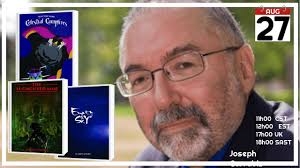Back in the late 1980s Joseph Carrabis had the idea that trauma is trauma, that Post-traumatic stress disorder (PTSD) is PTSD, meaning little difference existed psycho-emotively between the trauma a soldier suffers in combat and the trauma a child suffers in an abusive home. Nobody paid attention, so he wrote a book about it (wrote The Augmented Man in 1990). Now that concept is part of the psycho-therapeutic literature.
Joseph Carrabis was born in Melrose, MA and currently lives in Nashua, New Hampshire, United States of America. He is Founder and Chief Research Officer of The NextStage Companies and helps clients understand how people think and react to marketing, leveraging that information to improve marketing efforts. He has been awarded patents for Next Stage’s Evolution Technology, creating a new, disruptive field of technology and applications. Evolution Technology allows any programmable device to understand human thought and respond accordingly.

His latest novel, The Augmented Man, deals with the lifelong scars of severely abused children and combat PTSD. The plot revolves around a military experiment taking traumatized children and modifying them into monsters via genetic engineering and chemical stimulation to end an unwinnable war.
His Empty Sky deals with the nature of dreams and hope, and how without hope the world is lost because people lose the ability to envision a better future for themselves. His Tales Told ‘Round Celestial Campfires, an anthology of previously published work, contains stories of being so deeply in love you flee the gods in order to love as you wish, of doctors battling bureaucracy and protesters to keep an inner-city health center open, of a boy blinded by cancer who sees an Angel, of a wereman who desperately wants to love someone who won’t fear him, of a teacher of the deaf who falls in love with a merman and then must give up one of their children to the sea, and more.
Joseph has authored over 25 books, including Reading Virtual Minds Volume I: Science and History, Reading Virtual Minds Volume II: Experience and Expectation, Reading Virtual Minds Volume III: Fair-Exchange and Social Networks, and Tales ‘Told Round Celestial Campfires.
Carrabis says, “My editor tells people the two things they’ll find in all my writing are 1) a deep understanding of human psychology and 2) love. The greatest gift we can give each other is love and I’ll agree that all my stories are about love. I tend to demonstrate love through fantasy, science fiction, even horror. For example, in horror, can you create a monster that is a monster because it isn’t loved? Does it stop being a monster once someone cares for it? Another example, what if you’re a little boy who’s had his eyes removed because of cancer. Now all the other kids think you’re a monster because of your looks. Nobody’s willing to be your friend except the kid nobody at school likes — another kind of monster — and an intensely beautiful Angel who only you can see it.”
Like most fiction authors, Carrabis writes from experience. Work-wise he’s been everything from an apprentice butcher to a long-haul trucker to a Chief Research Scientist to a Neuro Marketer-in-Residence to an entrepreneur with several patents to his name. Along the way he’s also managed to gain expertise in anthropology (including field research), mathematics, psychology, and computer science. “The Goatmen of Aguirra is based on my studies of tribal societies living at high altitudes and Mani He is really about a modern man discovering his ethnic origins and exploring them. He have detailed through ‘Empty Sky’ published in 2016 and learnt how he pieced together the technology he created.”
Carrabis attributes his desire to write to his sister, Sandra. “She told me about a book she was reading in school and I’d never seen her so engaged, intent, and excited as she was describing that book. I wanted to give other people those kinds of feelings and at those levels. When a reader tells me they couldn’t put my book down or my stories changed their lives, I know I’ve succeeded as an author.”
He has designed, developed and delivered over 100 tools that analyze everything from group and individual social behaviors to product design and development to community development and monitoring to consumer psychology to resume analysis and improvement to finding compatible life-partners to personal growth to training measurement for governments, businesses and individuals worldwide.


